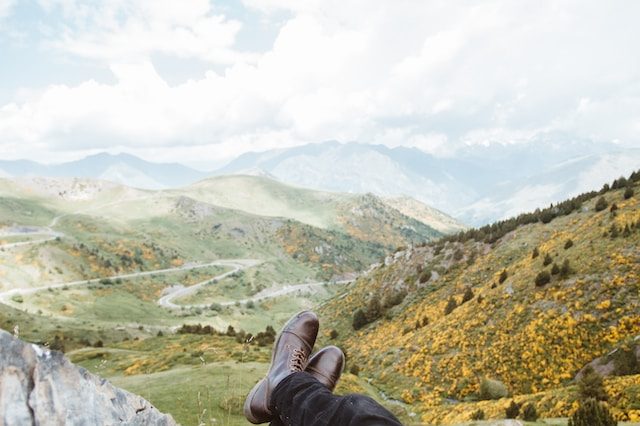Resting is hard
A client recently told me “I don’t know a lot about resting,” and it got me thinking about how I don’t either. I’ve gotten a lot better at resting in the last few years, when I was seriously bad at it prior. I mean truly terrible. If resting had come up and bit me in the butt, I would have complained about the bite mark.
In fact, that’s pretty much what I did because burnout forced me to rest and I complained, and cried, and whined, and ruminated my way through. Through multiple burnouts. Before I paid attention.
I’ve gotten a lot better, and I’ve learned a lot, but I’m far from perfect. I’m far from decent, frankly. I still have to convince myself multiple times a day that it’s okay to rest. So take everything that I’m about to say with a grain of salt. I’m just going to flat out say upfront that everything I’m about to say is probably bullshit, it won’t apply to you, and you can safely ignore me.
On that cheery note, here are six things I think I know about rest.
1. It feels unfamiliar
You can get so used to being busy that resting actually feels painful. It’s supposed to be restorative, right? It’s supposed to feel good, right? You’re supposed to want to do this thing, right? But when your standard M.O. is 110%, doing anything differently feels so unfamiliar that it’s scary and sometimes awful.
Your nervous system is like “What the hell? This isn’t what we’re used to, and I don’t know how to do this. So this is bad, right?” and that bad feeling can drive you, or at least me, to want to keep going because it just feels normal. It feels familiar.
2. We’re bad at it
We US-Americans are really terrible at resting. I don’t know how it is in other parts of the world, but I don’t think it’s just us. I think a lot of the western industrialized world has gotten really bad at resting. I know a priest who said on every feast day that our modern culture is really bad at feasting. We know how to fast. We know how to deny ourselves. We know how to sacrifice, but we don’t know how to enjoy, and I think he’s right.
Tell someone to feast and they just think of overindulging in food, but that’s not really feasting. That’s not enjoying the experience in a congratulatory and joyful way.
I have nothing against watching TV in my pajamas, but it’s a very limited scope of what rest could look like.
Ask a lot of modern industrialized westerners to rest and the only ideas we can come up with are spa days, bubble baths, and lying on the couch, scrolling through your phone or watching TV in your pajamas. I have nothing against any of that, and they can be restful, but it’s a very limited scope of what rest could look like. And it’s possible to do every one of those in an overly anxious and worried mindset. So the activities themselves are not inherently restful.
3. Worry and rest don’t mix
You’re not resting when you’re worried, ruminating, obsessing, freaking out, overwhelmed, getting on your own case, or judging yourself or others. Even if you’re not physically doing much, or anything, any thoughts that include those are not restful. It doesn’t matter if you’re getting the best massage ever, floating in a perfect sensory float tank, didn’t have to go out for a week, or got to stay in your pajamas at home and have food delivered. If you’re worrying and ruminating: you’re not resting.
4. Resting isn’t about activity
I think rest has a lot more to do with your mindset and what you’re doing, not how much.
Which leads me to believe that resting isn’t about having a little, or a lot, of activity. Because you can also be restful while you’re out doing stuff. Engaging in your special interests without guilt can be restful. Some people find adventurous vacations restful, even though they’re physically active the entire time.
I think that physically doing less is necessary sometimes, especially during burnout, but once you’ve gotten past sheer physical exhaustion, I don’t think that rest has very much to do with your level of physical activity. I think it has a lot more to do with your mindset and what you’re doing, not how much.
5. Do something you enjoy
So what you’re doing makes a difference. Since you need rest, I’m going to go out on a limb here and suggest that doing the same things you’ve been doing (i.e. working, taking care of family, running the kids to every activity imaginable, etc.) isn’t restful, but you could do other things like painting, going rock climbing, or whatever you happen to personally enjoy.
It could be crocheting, playing with animals, building a model train set, researching your new special interest, or watching a show you love. I don’t know what it’s going to be for you, but I think it has to be something different than your ordinary day to day activities in order to be restful and restorative. I also think you have to do it without guilt, shame, worry, or rumination.
6. It doesn’t need perfection
I don’t think rest has to be perfect. I don’t think you need the perfect setup, the perfect situation, having no guilt, or no worries. I think you can get a lot out of it even when it’s imperfect, even when it’s far from ideal, even when you have no particularly original or creative ideas and you’re just sitting in your pajamas on your phone, watching something that makes you laugh. I think that can be restful, and sometimes that’s exactly what you need.
I don’t know exactly how this works. I’m doing a lot of that imperfect, not particularly creative rest and getting plenty out of it. But sometimes I also go do some cheap activity to get out of the house, like going for a drive. I’ll go see some nature, even if it’s through the car window, and it’s frickin’ cold outside. Just doing something a little bit different than usual can do a lot of good.
Closing thoughts
I know I’ve got a lot to learn, but I’m getting better at this every month and every year.
I’m curious how this is landing for you and what you’ve figured out about rest so far; maybe how you want to translate this to your life?
Okay, I told you this wouldn’t be revelatory, and that you could probably safely ignore it. But perhaps you might have gotten one little thing out of this that you found useful?





3 Responses
Thanks for sharing. What you describe is very close to what I expérience. A long walk is a very restful experience for me.
i love this so much!! i read it a few months ago and bookmarked it to read again when i’m struggling with rest. i just read it again and am really appreciative of the way it’s all worded. so many of your posts have helped me a lot and i’m always so happy to hear more from you. thank you!!
So glad it resonates with you! Wishing you restorative rest in your life!